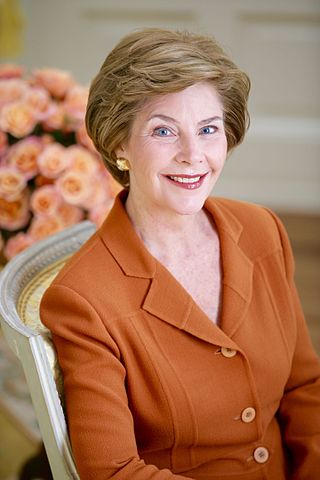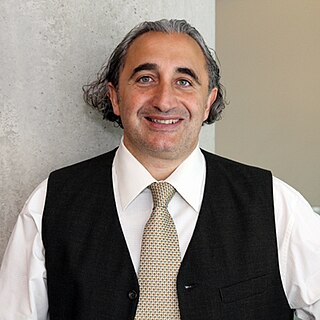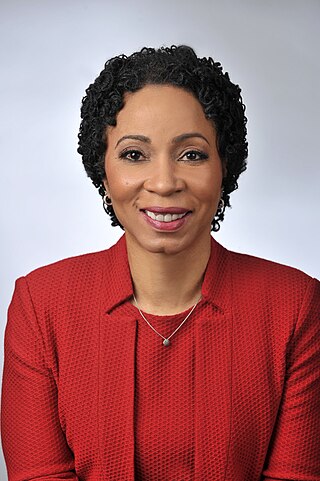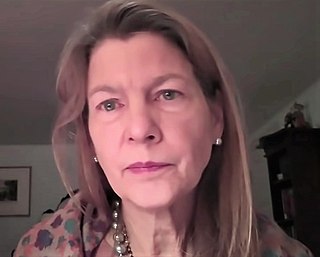Related Research Articles

Laura Lane Welch Bush is an American educator who was the first lady of the United States from 2001 to 2009 as the wife of George W. Bush, the 43rd president of the United States. Bush was previously the first lady of Texas from 1995 to 2000 when her husband was governor.

The combined oral contraceptive pill (COCP), often referred to as the birth control pill or colloquially as "the pill", is a type of birth control that is designed to be taken orally by women. It is the oral form of combined hormonal contraception. The pill contains two important hormones: a progestin and estrogen. When taken correctly, it alters the menstrual cycle to eliminate ovulation and prevent pregnancy.

Gender includes the social, psychological, cultural and behavioral aspects of being a man, woman, or other gender identity. Depending on the context, this may include sex-based social constructs as well as gender expression. Most cultures use a gender binary, in which gender is divided into two categories, and people are considered part of one or the other ; those who are outside these groups may fall under the umbrella term non-binary. A number of societies have specific genders besides "man" and "woman," such as the hijras of South Asia; these are often referred to as third genders. Most scholars agree that gender is a central characteristic for social organization.

The Bill & Melinda Gates Foundation (BMGF) is an American private foundation founded by Bill Gates and Melinda French Gates. Based in Seattle, Washington, it was launched in 2000 and is reported to be the third largest charitable foundation in the world, holding $69 billion in assets as of 2020. The primary stated goals of the foundation are to enhance healthcare and reduce extreme poverty across the world, and to expand educational opportunities and access to information technology in the U.S. Key individuals of the foundation include Warren Buffett, chief executive officer Mark Suzman, and Michael Larson.
Women's health differs from that of men's health in many unique ways. Women's health is an example of population health, where health is defined by the World Health Organization (WHO) as "a state of complete physical, mental and social well-being and not merely the absence of disease or infirmity". Often treated as simply women's reproductive health, many groups argue for a broader definition pertaining to the overall health of women, better expressed as "The health of women". These differences are further exacerbated in developing countries where women, whose health includes both their risks and experiences, are further disadvantaged.

The Women's Health Initiative (WHI) was a series of clinical studies initiated by the U.S. National Institutes of Health (NIH) in 1991, to address major health issues causing morbidity and mortality in postmenopausal women. It consisted of three clinical trials (CT) and an observational study (OS). In particular, randomized controlled trials were designed and funded that addressed cardiovascular disease, cancer, and osteoporosis.

Atul Atmaram Gawande is an American surgeon, writer, and public health researcher. He practices general and endocrine surgery at Brigham and Women's Hospital in Boston, Massachusetts. He is a professor in the Department of Health Policy and Management at the Harvard T.H. Chan School of Public Health and the Samuel O. Thier Professor of Surgery at Harvard Medical School. In public health, he was the chairman of Ariadne Labs, a joint center for health systems innovation, and chairman of Lifebox, a nonprofit that works on reducing deaths in surgery globally. On June 20, 2018, Gawande was named the CEO of healthcare venture Haven, owned by Amazon, Berkshire Hathaway, and JP Morgan Chase and stepped down as CEO in May 2020, remaining as executive chairman while the organization sought a new CEO.

Etonogestrel is a medication which is used as a means of birth control for women. It is available as an implant placed under the skin of the upper arm under the brand names Nexplanon and Implanon. It is a progestin that is also used in combination with ethinylestradiol, an estrogen, as a vaginal ring under the brand names NuvaRing and Circlet. Etonogestrel is effective as a means of birth control and lasts at least three or four years with some data showing effectiveness for five years. Following removal, fertility quickly returns.

Time 100 is a list of the top 100 most influential people, assembled by the American news magazine Time. First published in 1999 as the result of a debate among American academics, politicians, and journalists, the list is now a highly publicized annual event. It is generally considered an honor to be included on the list, but Time makes it clear that entrants are recognized for changing the world, regardless of the consequences of their actions. The final list of influential individuals is exclusively chosen by Time editors, with nominations coming from the Time 100 alumni and the magazine's international writing staff. Only the winner of the Reader's Poll, conducted days before the official list is revealed, is chosen by the general public. The corresponding commemorative gala is held annually in Manhattan.

Gad Saad is a Canadian marketing professor at the John Molson School of Business at Concordia University. He has argued for applying evolutionary psychology to marketing and consumer behaviour. He wrote a blog for Psychology Today and hosts a podcast titled "The Saad Truth".
The Million Women Study is a study of women’s health analysing data from more than one million women aged 50 and over, led by Dame Valerie Beral and a team of researchers at the Cancer Epidemiology Unit, University of Oxford. It is a collaborative project between Cancer Research UK and the National Health Service (NHS), with additional funding from the Medical Research Council (UK).
Hormone replacement therapy (HRT), also known as menopausal hormone therapy or postmenopausal hormone therapy, is a form of hormone therapy used to treat symptoms associated with female menopause. Effects of menopause can include symptoms such as hot flashes, accelerated skin aging, vaginal dryness, decreased muscle mass, and complications such as osteoporosis, sexual dysfunction, and vaginal atrophy. They are mostly caused by low levels of female sex hormones that occur during menopause.

Medroxyprogesterone acetate (MPA), also known as depot medroxyprogesterone acetate (DMPA) in injectable form and sold under the brand name Depo-Provera among others, is a hormonal medication of the progestin type. It is used as a method of birth control and as a part of menopausal hormone therapy. It is also used to treat endometriosis, abnormal uterine bleeding, paraphilia, and certain types of cancer. The medication is available both alone and in combination with an estrogen. It is taken by mouth, used under the tongue, or by injection into a muscle or fat.

Francis Sellers Collins is an American physician-scientist who discovered the genes associated with a number of diseases and led the Human Genome Project. He served as director of the National Institutes of Health (NIH) in Bethesda, Maryland, from 17 August 2009 to 19 December 2021, serving under three presidents.

Helene D. Gayle is an American physician, and academic and non-profit administrator. She has been president of Spelman College since 2023. She formerly was CEO of the Chicago Community Trust, one of the nation's leading community foundations. Earlier in her career she was the director of international humanitarian organization CARE, and spent much of her career in the field of public health research in epidemiology at the CDC.
The anti-aging movement is a social movement devoted to eliminating or reversing aging, or reducing the effects of it. A substantial portion of the attention of the movement is on the possibilities for life extension, but there is also interest in techniques such as cosmetic surgery which ameliorate the effects of aging rather than delay or defeat it.

Eli Erlick is an American activist, writer, academic, trans woman and founder of the organization Trans Student Educational Resources.

Estradiol (E2) is a medication and naturally occurring steroid hormone. It is an estrogen and is used mainly in menopausal hormone therapy and to treat low sex hormone levels in women. It is also used in hormonal birth control for women, in feminizing hormone therapy for transgender women and some non-binary individuals, and in the treatment of hormone-sensitive cancers like prostate cancer in men and breast cancer in women, among other uses. Estradiol can be taken by mouth, held and dissolved under the tongue, as a gel or patch that is applied to the skin, in through the vagina, by injection into muscle or fat, or through the use of an implant that is placed into fat, among other routes.

Heidi J. Larson, Lady Piot is an American anthropologist and the founding director of the Vaccine Confidence Project. Larson headed Global Immunisation Communication at UNICEF and she is the author of Stuck: How Vaccine Rumors Start and Why They Don't Go Away. She was recognized as one of the BBC's 100 women of 2021.
The timing hypothesis, gap hypothesis, gap theory, or critical window hypothesisfor menopausal hormone therapy is a scientific theory that the benefits and risks of menopausal hormone therapy vary depending on the amount of time a woman has been in menopause upon initiation of treatment. More specifically, it is thought that hormone therapy may be protective against coronary heart disease in women who initiate it in early menopause but may be harmful in women who start it in late menopause. The timing hypothesis may also extend to risks of breast cancer and dementia with hormone therapy. It is thought that the increase in breast cancer risk may be greater in women who start hormone therapy in early menopause but may be lower or that even decreased risk of breast cancer may occur in women who start in late menopause. The influence of hormone therapy on depressive symptoms may additionally be influenced by menopausal stage, with significant benefit seen in perimenopausal women but not in postmenopausal women. The timing hypothesis is potentially able to resolve conflicting findings between large observational studies and randomized controlled trials on long-term health outcomes with menopausal hormone therapy.
References
- ↑ "WHI - Jacques Rossouw retires". Women's Health Initiative. Archived from the original on 7 September 2015. Retrieved 16 January 2016.
- ↑ Rose George (15 December 2015). "What science doesn't know about the menopause: what it's for and how to treat it". The Guardian . Retrieved 16 January 2016.
- ↑ "Maybe You're Not What You Eat". The New York Times . 14 February 2006. Archived from the original on 11 August 2015. Retrieved 16 January 2016.
- ↑ "New Data On Health: Studies in Confusion". Washington Post . Archived from the original on 9 January 2018. Retrieved 16 January 2016.
- ↑ Tara Parker-Pope (10 July 2007). "How NIH Misread Hormone Study in 2002". WSJ . Archived from the original on 17 September 2017. Retrieved 16 January 2016.
- ↑ Rabin, Roni (2006). "Rethinking Hormones, Again". The New York Times. ISSN 0362-4331. Archived from the original on 8 January 2018. Retrieved 8 January 2018.
- 1 2 Marika Sboros. "Tim Noakes uses science to stick knife into critics". BizNews.com. Archived from the original on 13 December 2015. Retrieved 16 January 2016.
- ↑ "Jacques Rossouw - The 2006 TIME 100 - TIME". TIME.com . 8 May 2006. Archived from the original on 18 April 2016. Retrieved 16 January 2016.